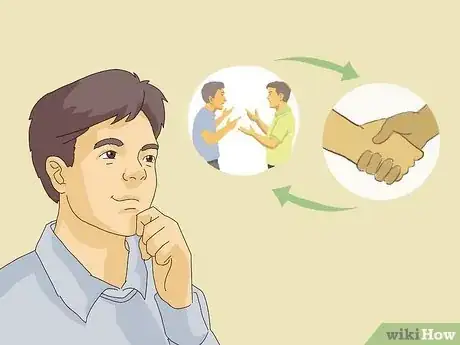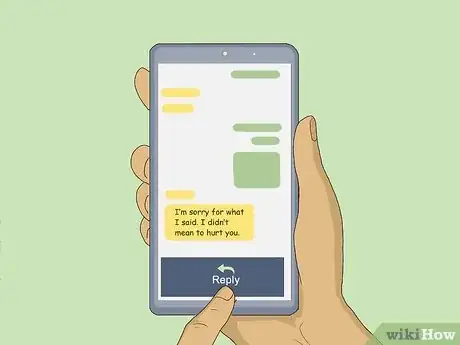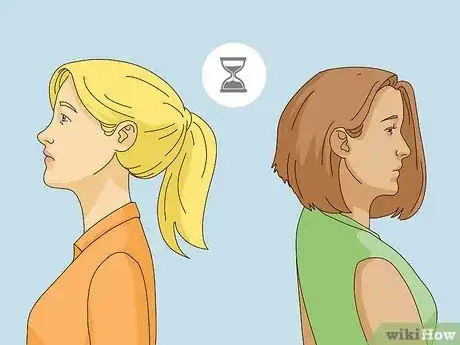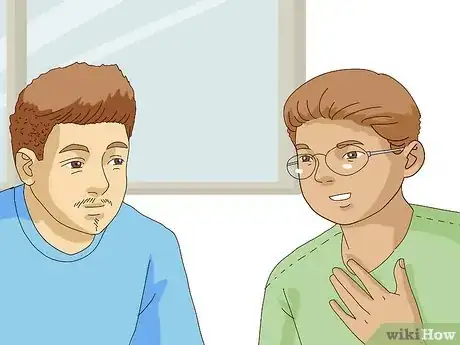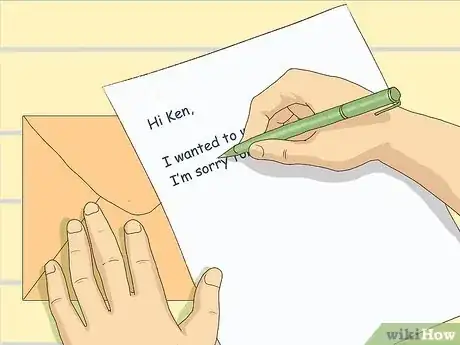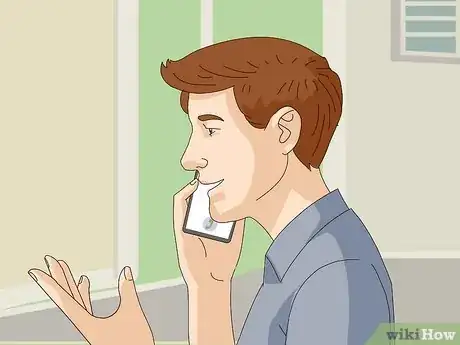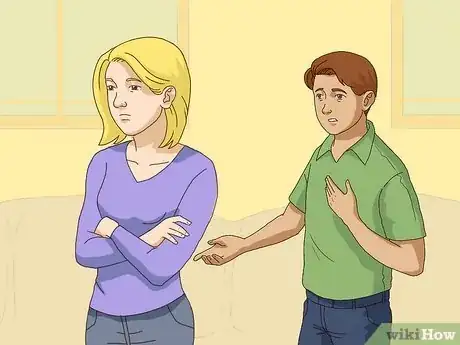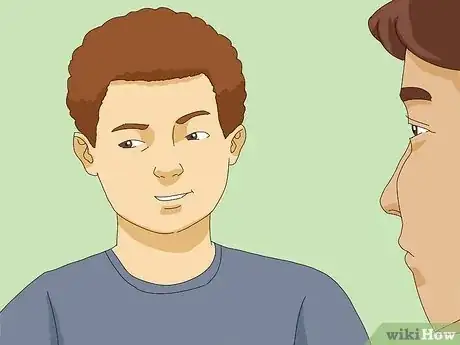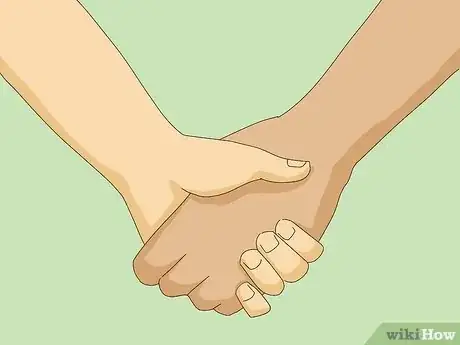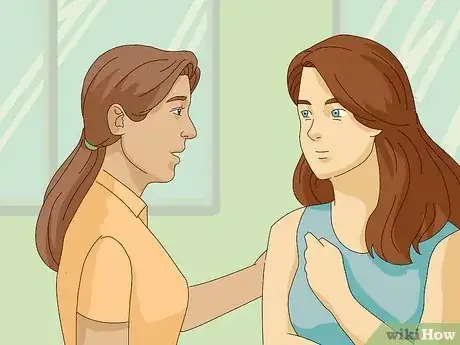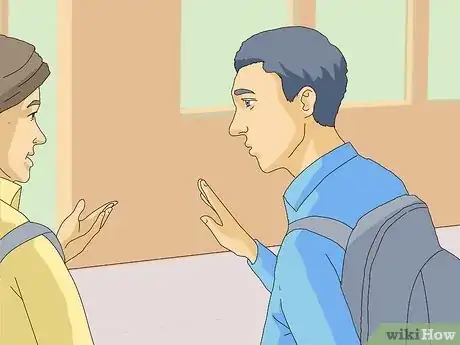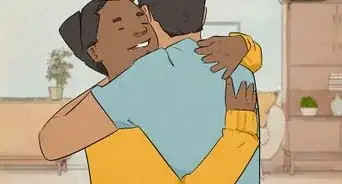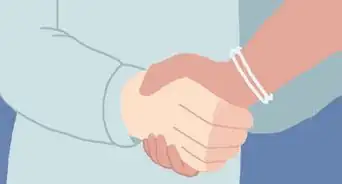This article was co-authored by Lisa B. Kift, MFT. Lisa B. Kift is a Licensed Marriage and Family Therapist (MFT) for California Online Therapy and Counseling and the Founder of Love and Life Toolbox, which offers tools for emotional health and relationships. With over 15 years of experience, Lisa specializes in family of origin work and relationship issues. In addition to being licensed with the California Board of Behavioral Sciences, Lisa has a Masters of Counseling Psychology from National University. She offers individual and couples counseling online for California residents or face-to-face in Larkspur, Marin County, CA. Lisa is a frequent consultant for the media and has written for news and other online resources such as CNN, HuffingtonPost, Shape, and MensHealth.
There are 7 references cited in this article, which can be found at the bottom of the page.
This article has been viewed 34,953 times.
After fighting with a friend and breaking up your friendship, it may feel impossible to be friends again. Learning to mend broken relationships is an important part of maturing and growing as a person. To mend a broken friendship you must deal with the disagreement, move past the mistakes, and rebuild your relationship.
Steps
Dealing with the Disagreement
-
1Realize that conflicts are normal. Even people in healthy relationships will have fights and disagreements. Problems in the relationship only occur if you fail to handle the conflict properly. If you or your friend struggles with handling conflict, your relationship can be harmed. By using good communication and problem solving skills, you can keep your friendship healthy.
- Actively listen to your friend.[1]
- Make compromises so that you’re both happy.
-
2Seek a healthy resolution. When you have a disagreement with your friend, you can experience strong intense emotions. This often leads to hurt feelings, disappointment, and discomfort. When you are unable to work through your issues, you may be left feeling hurt. Instead, work with your friend to resolve your issues so that you can build trust and a deeper, stronger bond between the both of you.Advertisement
-
3Give each other some space. After you have had an argument with a friend, you should consider giving it some time before you try to talk to them again. People tend to say hurtful things when emotions are high. Allow each party some time to relax before reaching out to your friend again.[2] [3]
- Allow two to three days for you and your friend to calm down before trying to reach out to your friend.
-
4Vent your frustrations. It is normal and healthy to confide in someone when something is really bothering you. While you give your friend some time to cool down, take some time to vent your feelings and frustrations to a trusted friend or family member. You will feel much better once you have received some advice and validation.[4]
- For example, if you friend said something hurtful to you about your weight, you might confide in another friend by saying, “It really made me angry when Anna pointed out that I had gained weight.”
-
5Reach out by letter. Once you have taken a few days to calm down, writing a letter to your friend is a good first step when reaching out after an argument. You can write to them by email, social media, or snail mail. Though reaching out can be difficult, you should avoid waiting too long to reach out to your friend. The longer you go without talking to your friend the harder it will be to repair the relationship.[5]
-
6Reach out to them by phone. Reconnect with your friend with a phone call or text message. Have a conversation about your parting ways. Suggest that you get together for lunch or coffee to continue the conversation in person. If distance has put a strain on your friendship, consider scheduling regular phone calls to keep in touch.[6]
- Discuss why you parted ways and why you are interested in rekindling the friendship.
- Address any hurt feelings or concerns that you may have.
Moving Past the Mistakes
-
1Apologize for your wrongdoing. It is easy to see where the other person is wrong. It is difficult to admit to your own wrongdoing after a disagreement. Determine what it is that you did wrong and how you can fix it. Then, reach out to your friend with an apology.[7] [8]
- For example, you may feel like you weren’t listening to your friend’s complaints. You may say to them, “I’m sorry for being a poor listener when you were trying to talk to me.”
- Don’t expect to receive an apology in return. Your friend may not believe that they owe you an apology.
-
2Avoid unhealthy responses. As you work through a disagreement, it’s easy to fall on unhealthy responses, but they won’t help you fix your friendship. Unhealthy responses include refusing to acknowledge your friend’s point-of-view, reacting with anger, withdrawing from your friend, and fearing that the worst will happen. If you catch yourself doing these behaviors, choose a healthy response instead.
- Listen to your friend’s concerns, then repeat back what you heard to see if that’s what they meant. Don’t argue with their feelings; instead, tell them that you understand how they feel before you share your side.
- Stay calm when talking to your friend, and don’t put all of the blame on them, even if you feel like it’s their fault. Try taking a deep breath or counting to 10 before you speak.
- Reach out to your friend to talk through your issues.
- Remember why you’re friends in the first place. Trust that your friend wants to work things out, too.
-
3Accept apologies. If your friend is ready to apologize, allow them the space to do it. Listen to everything they have to say and truly accept their apology. Don’t grant your friend forgiveness until you are really ready to forgive them.[9]
-
4Let go of the past. Letting go of the past is a long, ongoing process. In order to let go of the past you must be willing to change your attitude. Be ready to truly forgive your friend and move past the disagreement. Don’t hold those wrongdoings over your friend’s head forever. Avoid getting hung up on who was at fault.[10]
-
5Discuss a way forward. Talk to your friend about what you need from them in order to mend the friendship. Then, ask for them to tell you what they need out of the friendship. When they talk to you, be sure to actively listen.
Rebuilding the Friendship
-
1Spend time together. Find time to commit to your friend again. In order to rebuild your trust and friendship, you will need to spend time together again. If you are unsure about how much time you should spend together, consider taking it slowly. You will begin to feel a sense of loyalty to your friend again.[11]
-
2Be dependable. Part of being a good friend is being a dependable friend. Listen to your friend when they are confiding in you. Be available to them when they need you. Stick to your commitments and do what you say that you are going to do. Being dependable is very important in repairing broken trust in a friendship.[12] [13]
- For example, if you have agreed to take a weekly yoga class with your friend, be sure to make every effort to keep that commitment.
-
3Set boundaries. Know what your core beliefs and values are. Use these to help you set boundaries within a friendship. Be sure to articulate these boundaries with your friend. Ask your friend to do the same. This will help to prevent harmful words or actions in the future.[14]
- For example, you might set a boundary regarding comments about how you raise your children. If your friend knows up front that criticizing your parenting could result in an argument, they may choose not to discuss it.
Warnings
- Your friend may not be interested in forgiveness or mending the relationship.⧼thumbs_response⧽
References
- ↑ Lisa B. Kift, MFT. Licensed Marriage & Family Therapist
- ↑ Lisa B. Kift, MFT. Licensed Marriage & Family Therapist
- ↑ http://tinybuddha.com/blog/how-to-mend-a-broken-friendship-even-if-youre-not-on-speaking-terms/
- ↑ http://tinybuddha.com/blog/how-to-mend-a-broken-friendship-even-if-youre-not-on-speaking-terms/
- ↑ https://sliwinski.com/why-you-should-reconcile-with-old-friends/
- ↑ https://sliwinski.com/why-you-should-reconcile-with-old-friends/
- ↑ Lisa B. Kift, MFT. Licensed Marriage & Family Therapist
- ↑ https://sliwinski.com/why-you-should-reconcile-with-old-friends/
- ↑ http://tinybuddha.com/blog/how-to-mend-a-broken-friendship-even-if-youre-not-on-speaking-terms/
- ↑ http://www.ignatianspirituality.com/22748/two-differences-between-forgiveness-and-reconciliation
- ↑ http://www.mindbodygreen.com/0-20069/why-spending-time-with-friends-boosts-your-oxytocin.html
- ↑ Lisa B. Kift, MFT. Licensed Marriage & Family Therapist
- ↑ https://www.psychologytoday.com/blog/lifetime-connections/201503/the-13-essential-traits-good-friends
- ↑ http://www.mindbodygreen.com/0-13176/6-steps-to-set-good-boundaries.html
